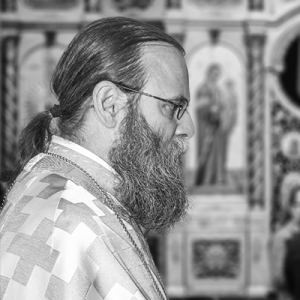“Walking the Talk” — The Sacramental Life
— Fr. Bohdan Hladio
January 2009 A.D.
Participation in the Holy Mysteries (Sacraments) is an essential element in the life of anyone who wishes to draw closer to God and be a healthy member of Christ’s body, the Church.
As Christians, we believe that God created everything good, and that everything in this fallen world can be sanctified. The physical manifestation of this conviction is found in the sacramental life of the Church, where water, oil, bread, wine, people, even sickness and death, are offered to God sacrificially in order that He might bless and sanctify them, and through them all of creation.
Jesus Christ did not preach a philosophy, but a way of life. He did not propose ideas for our consideration, but gave commandments that we might observe them. As members of His “one, holy catholic and apostolic Church” we continue to do and teach the things which Jesus and the Apostles did and taught – among them, performing and partaking in the Holy Mysteries of the Church.
Seven Holy Mysteries are generally regarded as fundamental by Orthodox Christians:
- Baptism,
- Chrismation,
- Confession,
- Communion,
- Marriage,
- Ordination,
- and the Anointing of the Sick.
In all of these we see a biblical precedent.
Before beginning His ministry Jesus was baptized (Mk. 1:9). Following baptism, the Holy Spirit was imparted to believers (Acts 8:17), which is the essence of the Holy Mystery of Chrismation.
Jesus says to his apostles “If you forgive the sins of any they are forgiven them, if you retain the sins of any, they are retained” (Jn. 20:23), and St James writes “confess your trespasses to one another… (James 5:15). At the last supper Jesus says “Take, eat, this is my Body which is broken for you… this cup is the new covenant in my blood. This do… in remembrance of Me.” (I Cor. 11:24, cf. Mt. 26:26–28, Jn. 6: 51-56), personally establishing the Holy Mysteries of Confession and the Eucharist.
When questioned by the Pharisees Jesus states that marriage between man and woman is a divine institution (Mt. 19: 4-6). The ordination by laying on of hands is clearly attested to in the apostolic preaching (I Tim. 5:22, Heb. 6:2 etc.), as is the practice of anointing the sick with oil (James 5: 14-15).
Besides these seven mysteries, we also have such sacramental acts as the blessing of water, the monastic tonsure, the funeral service, etc. In all of these acts we see a process of offering and return – we offer something to God, He accepts it, blesses it, and offers it back to us in a sanctified form. In the Eucharist we offer bread and wine, which God returns to us as His Body and Blood. In confession we offer our repentance. In Anointing of the Sick we offer our suffering, in Marriage, our relationship. In Chrismation and Ordination we offer God our service. In Baptism, the Monastic Tonsure, and the Funeral, we offer God our life.
Given the opportunity to partake of the sacramental life, to receive the grace and blessings God has to offer, why is it that some people — even some who consider themselves to be Orthodox Christians in good standing with the Church — simply refuse? Sometimes this might be due to ignorance or misunderstanding, sometimes it might be due to pride (“Why do I need to go to confession? I’m not so bad! I’m a lot better than most people, and that priest – who’s he to tell me how I should live!”), but in general it’s usually due to the secular mindset which characterizes our society and is imparted through formal education and the mass media.
Fr. Alexander Schmemann asserts that secularism is a negation of worship, and by extension, a negation of sacramentality (cf. For the Life of the World). If this world really is all that exists, and if all that exists really is the result of blind chance (the foundational myth and accepted dogma of the materialist scientific establishment) sanctity and sanctification can only be fantasies, on a level with belief in the Easter Bunny.
If, on the other hand, God does exist, and wishes to share His life and His grace with us, participation in the Holy Mysteries – the sacramental life – is a sure path to knowledge of and union with Him (Jn. 17:3). As Fr. Alexander beautifully states, the Church does not possess or perform the sacraments, the Church is sacrament – the sacrament of God’s presence in the world.
For almost 2,000 years believing Christians have partaken of the Holy Mysteries — simple people as well as geniuses; people of all social strata; saints as well as sinners; people of virtually every human culture under the sun. We all know the scientific method – a theorem is proposed, then tested by experiment. Here is a question for those who would dismiss the Holy Mysteries of the Church as unnecessary or optional – “if people were not being benefitted by participation in the Holy Mysteries why would these practices be maintained?” We have 2,000 years worth of testimony as to the efficacy and benefit of the Holy Mysteries, to the comfort, healing and spiritual growth of those who partake of the Holy Mysteries in faith.
God wishes to share His abundant grace and divine life with us, and does so in the Holy Mysteries. Let us accept this gift, sharing our joys, our sorrows, and our whole life with Him.

